Sleep disorders cause many Americans to lose out on the shut-eye that they need, causing a variety of general and oral health problems. Thankfully, there is a simple solution that may be able to put your sleeping woes behind you: mouth taping.
Sound bizarre?
That’s what most people think at first, but using tape to keep your mouth closed and to encourage nose breathing can be extremely beneficial. Breathing through your nose is essential to good sleep and improved physical, dental, and oral health.
We’ve dedicated this article to mouth taping and how to sleep with your mouth closed. We’ll also answer the following questions:
- What is mouth taping?
- What are its benefits?
- How does it work?
We hope this information helps you get better sleep and improve your oral and overall health.
In This Article
What is mouth taping?
The basic concept involves taping your mouth shut while you sleep to promote nasal breathing. Before explaining in more detail what mouth tape actually is, it is important to understand what it is not.
While most people imagine mouth tape as duct tape or any other random tape bought from a store, it’s actually a minimally invasive, safe, and pain-free method to stop mouth breathing at night and promote breathing via the nose.
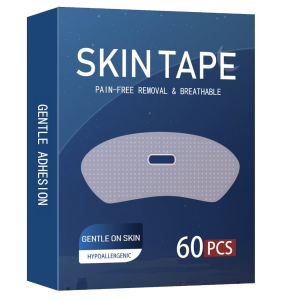
breathing during sleep
There are various products on the market, such as Skin Tape sleep strips, that help you train yourself to sleep with your mouth closed. These strips are hypoallergenic, comfortable, and easily removable. Most types of mouth tape are soft with a gel-like consistency and shaped to fit precisely over your mouth, instead of being a regular tape. Strips are made with built-in vent so if your nose gets stuffed up at night, you can still breathe through the tape. What’s more, this tape comes off easily leaving no residue on the lips.
Another thing to keep in mind is that if you have the ingrained habit of breathing through your mouth, then it’s likely that it will take a while to get used to breathing through your nose at night. In order to help the process along, you should also make sure that you practice nasal breathing throughout the day as well.
Is it bad to sleep with your mouth open?
The human mouth is for talking, tasting, and eating and the nose is for smelling and breathing. When your body parts start performing functions other than those intended for them, problems begin to arise. It can be quite harmful to sleep with your mouth open. Unless you are severely congested, this should not be the primary way you breathe.
Conservative treatments at home like mouth taping may be all that’s needed to treat patients with mild to moderate sleep apnea. These treatments also include lifestyle modification (such as losing weight, quitting smoking, or limiting alcohol intake) and using a CPAP machine while you sleep.
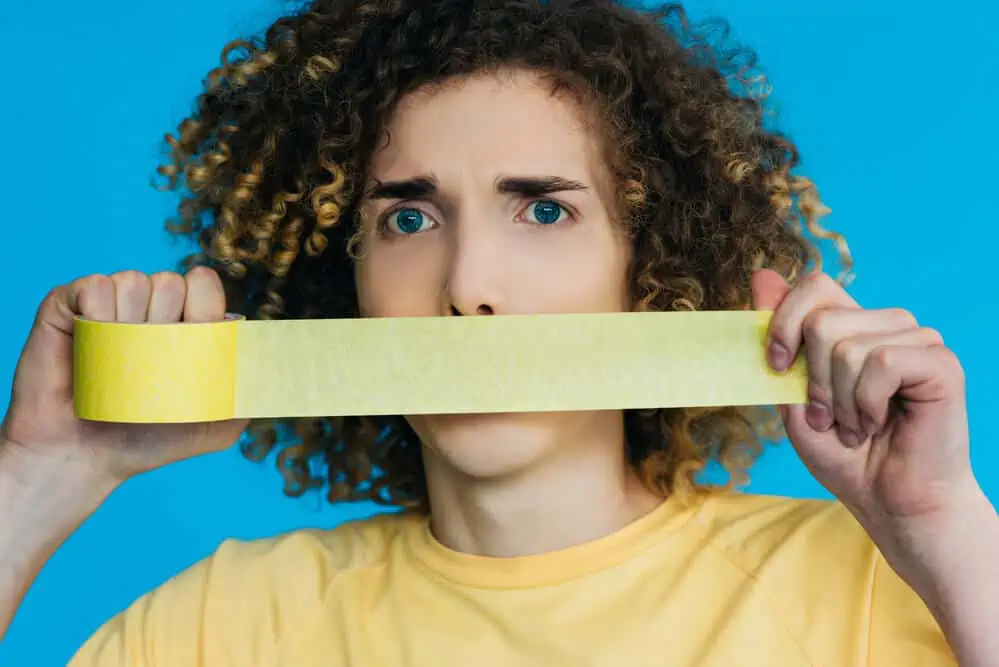
If nonsurgical treatments are ineffective, or if the condition is severe, surgical intervention may be the most effective treatment. This involves repositioning the upper and/or lower jaw or removing tissue from the back of your throat.
Depending on your condition, the procedure may take place right in an oral surgeon’s office or at a hospital.
Dr. Michael Ferguson, Oral Surgery Sevices
When you breathe through your mouth, a larger volume of air is forced through the airway than when you breathe through your nose. Inhaling air in such massive volumes can cause the airway to collapse, resulting in sleep apnea. Mouth breathing in adults may also lead to several other problems such as snoring and drooling. It can also worsen asthma and disrupt the oxygen supply to the brain, heart, and other organs. Mouth breathers also tend to experience fluctuations in heart rate and blood pressure.
Furthermore, children who practice mouth breathing develop various health issues such as misaligned teeth, abnormal facial growth, poor sleep habits, and decreased cognitive skills.

Experts suggest that the symptoms of mouth breathing in most teenagers and children are similar to the symptoms of ADHD. Scientists have also indicated that more than half of children diagnosed with ADHD might be engaged in mouth breathing.
How to tell if you are a mouth breather
Before you can actually start using a sleep tape to keep your mouth shut at night, it is important to make sure that you are breathing through the mouth instead of your nose. So how do you know for sure if you are a mouth breather?
Many people who breathe through their mouths don’t realize it at all. No matter how much nose breathing you practice throughout the day, you can still start mouth breathing as soon as you go into a deep sleep. Do you often notice any of these symptoms on a daily basis?
- Constantly tossing and turning at night
- Waking up in the middle of the night to urinate
- Snoring
- Having bad breath in the morning
- Bleeding gums or gingivitis
- Signs of teeth grinding
- Cavities
- Drooling on the pillows
- Sleep-related problems like sleep apnea
If you answered yes to any of these symptoms, you might be a mouth breather.
Treatment for sleep apnea
If you have sleep apnea, you might need more intensive treatment than mouth taping. That’s where Daybreak comes in. Just make your impression kit at home and you’ll get your custom-fit Daybreak device. And if you aren’t sure if you have sleep apnea, order the test first!
LIcensed doctors will review your test results to make an accurate diagnosis.
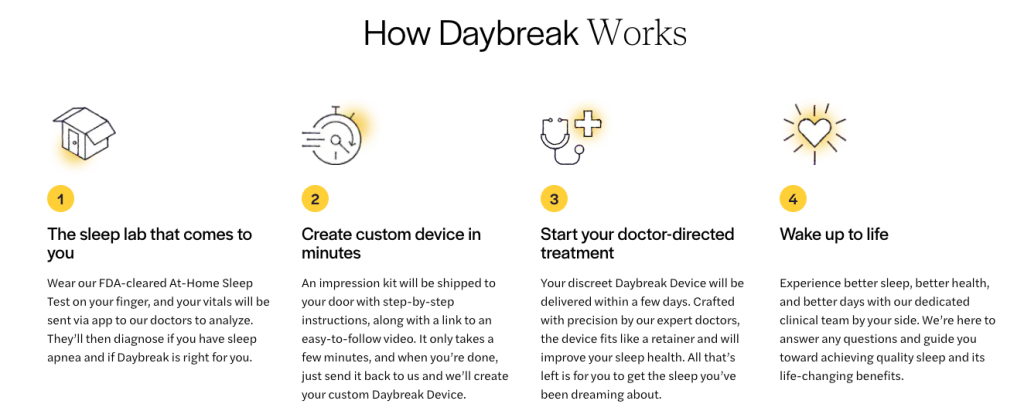
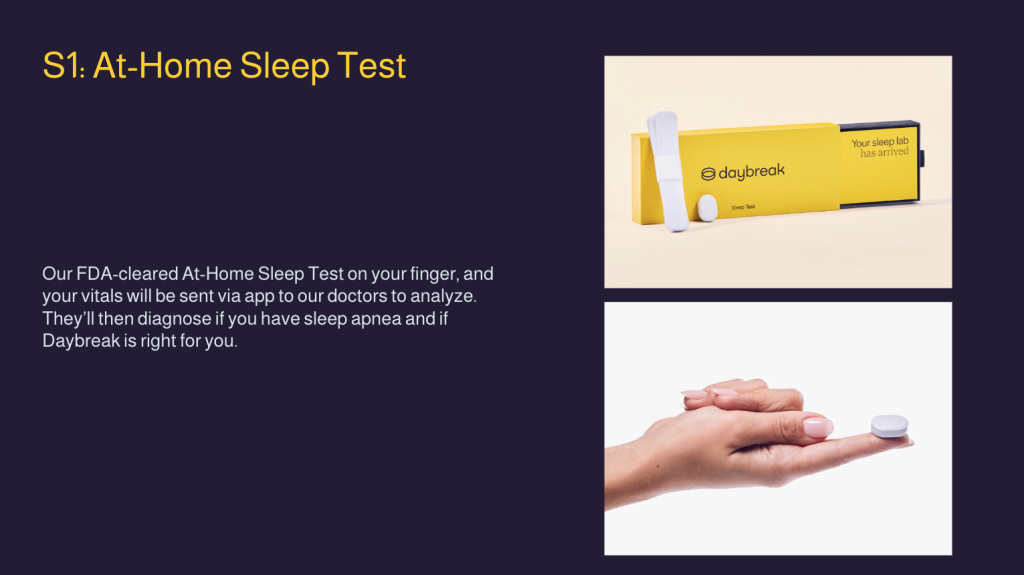
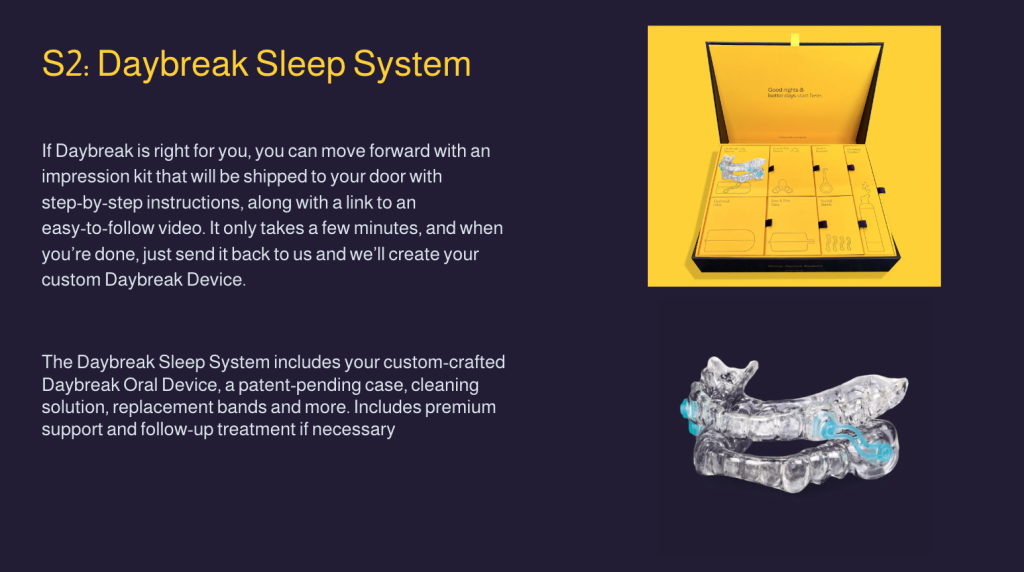
Benefits of mouth taping
Let’s have a look at the different ways that mouth taping can help your health.
Increased levels of nitric oxide
Both children and adults who breathe through their mouths develop a nitric oxide deficiency in their bodies. Around 25% of nitric oxide is produced in the sinuses within the nose. When you stop breathing through the nose and use your mouth instead, it reduces the amount of nitric oxide that your body can access.
But why is nitric oxide so important for the body? What happens if its levels suddenly drop? The following table summarizes the advantages of having adequate nitric oxide (NO) levels in the body as well as the disadvantages if deprivation occurs.
Advantages of adequate NO | Disadvantages of decreased NO |
Enhancement of learning and memory | Worsened vascular function in the heart |
Improvement of sleep quality | High blood pressure |
Regulated blood pressure | Depression and anxiety |
Regulation of inflammatory responses | Chronic inflammation |
Pain relief | Decreased immunity |
Weight loss | |
Improved mental health |
Decreased risk of teeth grinding
Many people who sleep with their mouth open suffer from some form of disordered sleep breathing such as sleep apnea. When you suffer from sleep breathing problems, your body uses teeth grinding as a natural reflex to force air through your airway. While it is actually a life-saving process, teeth grinding may also lead to extensive tooth damage. It may cause tooth decay, yellowing of teeth, and gum recession, as well as premature aging of the teeth.
Decreased risk of dry mouth

Many people who have dry mouth aren’t actually aware of it. Waking up feeling thirsty, or having thick saliva in your mouth throughout the day are some signs you may have it.
Having a dry mouth is not only uncomfortable but also a potential danger to health. It can negatively affect your dental and oral health and is harmful to your oral microbiome as well. A dry mouth can prevent saliva from properly coating your teeth; this saliva is important in keeping your enamel healthy, so as a result, cavities begin to develop.
Helpful in diagnosing serious issues
Mouth taping not only promotes nose breathing during sleep but it’s also a great diagnostic tool. For example, a lot of patients seek help from an ENT (head and neck specialist), a sleep medicine physician, or an allergist after realizing that they are unable to use mouth tape throughout the night. These specialists can then find the root causes of the patient’s need for mouth breathing, and start treatment.
Tips for optimal mouth taping
Mouth tape will encourage you to breathe through the nose, even when you are in deep sleep. If the mouth tape is continuously removed because you open your mouth to breathe during sleep, it serves as a warning to that you may have another underlying issue.
Mouth taping may seem easy—all you need to do is get some tape and use it to cover your mouth, right? There’s a little more to it than that. So how exactly do you use mouth tape? Here are some tips and tricks to help you out.
- Apply a thin layer of Vaseline to the lips before taping them: Applying Vaseline in a thin layer can reduce the sticky feeling on your lips in the morning. If you are not comfortable taping your entire mouth, begin taping a section of your lips from top to bottom like a mustache. Leave a small space for breathing. Keep practicing this until you become completely comfortable with mouth taping.
- Mold the tape as per your needs: If you have surgical tape, tear off a little more than you need and fold its end at each side to form mini handles. These handles will make it easier to pull the tape back on a temporary basis. For example, if you need to take a sip of water, talk, or cough, you can use the mini handles to slightly pull off the tape and then readjust it once you are done.
- Let your body adjust: You might want to try taping your mouth for a fixed period of time during the day just to make yourself more comfortable and get used to the practice of mouth taping at night.
Some other tips to help you use mouth tape are:
- Use specially-shaped strips that will fit onto your lips without sticking to your facial hair. We mentioned Skin Tape above as a good option that you can purchase online.
- Try puckering your lips out first, then attach the sticky side of the tape to the lips. Once the tape is attached, let your lips relax into their normal closed position.
- Once you put the tape on your mouth, try opening your mouth once. If it is not fairly easy to open the mouth with a bit of force, try the process again to obtain a better fit.
If you notice that you take off the tape long before you wake up, it could mean that there is some underlying problem that is not allowing you to breathe through your nose while sleeping.
If this continues to happen, you’ll want to talk with your doctor about it. They’ll help you get to the root of the problem and find a solution. Some common culprits behind this problem include having a dusty bedroom, a deviated nasal septum, or allergies.
Otherwise, you might not have any underlying health problems, but it could still take you a few weeks to a few months to get used to mouth taping. Don’t be disappointed if you wake up with your mouth open at the beginning.
You can learn some more tips about mouth taping from Dr. Mark Burhenne in the following video.
It is also important to note that there are no contraindications for mouth taping. Pregnant women and even older children can use mouth tape safely without any fear, especially if they use a gentle version of mouth tape such as surgical tape or brands meant specifically for this use. If you are encouraging your children to use mouth tape, make sure they are able to open their mouths with ease. The use of mouth tape is, however, not recommended for babies or young children.
Mouth taping options and alternatives
There are a few options to help prevent mouth breathing while you sleep.
Daybreak sleep system
Do you think you may have sleep apnea? If so, you can order the Daybreak sleep apnea test to find out. Take the test and send it back in, and a team of doctors will review your results.
And if you already know you have sleep apnea, you can order the daybreak sleep system now.

Skin Tape
Skin Tape sleep strips is a good product for people trying mouth taping for the first time. Here’s why:
- Clinically proven to improve breathing and reduce snoring
- Shaped to fit over the lips and avoid facial hair
- A built-in vent allows for limited mouth breathing
- Comes off when the mouth is opened
- No sticky residue in the morning
Thousands of happy consumers are using these to improve their sleep by taping their mouth shut at night. Here’s what one reviewer says:
“My throat and nose felt EXACTLY the same way as they did when I went to bed 6 1/2 hours earlier. No dryness. No congestion. No disgusting phlegm build up. No dried nose mucus. (Sorry for the overshare.) My nose and throat felt normal.”
Shawn
Azazar mouth tape
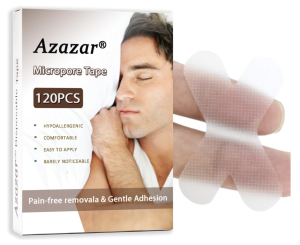
Azazar mouth tape doesn’t cover the whole mouth and is hypoallergenic, which can help if you have sensitive skin. The mouth tape is discreet. Additionally, the company is committed to environmental-friendly practices—the product and packaging material is all recyclable. One Amazon reviewer said the following:
“After trying several products this one works the very best. With the longer adhesive “legs” provided by the X design, there is no chance of it slipping off the lower lip. It also works with my beard.”
Anti-snoring chin strap
If the idea of mouth tape isn’t for you, there are alternatives that can help keep your mouth closed while you’re sleeping. One of these alternatives is an anti-snoring chin strap. These chin straps, as you might imagine, hold your chin closed while you sleep while keeping your mouth uncovered.
Mouth guards
This is another alternative to mouth tape. A mouth guard worn while you sleep is used to help prevent snoring, and even teeth grinding. This can be particularly effective if you experience both issues at night.
Conclusion
Breathing with your mouth open, whether during the day or while you sleep, can cause a variety of oral health and general health issues. For this reason, many experts recommend taping your mouth at night as a preventative measure. While some people tend to stop mouth taping once they overcome the problem, it is generally recommended to keep doing it forever. It is completely safe for everyone (except for small babies and younger children) and has no negative effect on health. For best results, you might want to consider purchasing mouth tape that is specifically made for this purpose. Also, it’s always best to consult your physician before beginning an at-home treatment.
FAQs
If my nose becomes stuffy during the night, will mouth tape make me suffocate?
No. If your brain notices your inability to breathe freely because of any issue such as a stuffy nose, it will force you to grind your teeth and eventually wake you up. While taping your mouth shut sounds scary, it cannot overcome the natural desire of your body to keep breathing. In most cases, you will remove the tape from your mouth without realizing it.
Most commercial mouth tapes have a vent to provide your nose with a backup in situations where your sinuses get congested. People who are worried about suffocation should purchase mouth tape with vents to alleviate fear.
Are there people who should never use mouth tape?
So far, there are no contraindications for mouth taping. This means that anyone who wishes to use mouth tape can safely do it, though the process is not recommended for babies or very young children. However, for older children and adults, mouth taping is perfectly safe and a great way to enhance quality of life.
How long should I use mouth tape?
Many people who start mouth taping never stop. And while for some people a few weeks or months is enough, others will require more time. Speak to your doctor about what they recommend for you.
What if mouth tape doesn’t work for me?
If you find that your mouth tape has separated when you wake up, it could be an indication that you are still breathing through your mouth at night. This may happen to anyone on occasion. However, if you find it happening frequently, you should consult an ENT, dentist, or a myofunctional therapist.
Acta physiologica scandinavica: Decreased pulmonary vascular resistance during nasal breathing: modulation by endogenous nitric oxide from the paranasal sinuses. Consulted 23 March 2020
Pediatric research: Abnormal blood pressure in prepubertal children with sleep-disordered breathing. Consulted 23 March 2020
Journal of sleep research: Neurobehavioral correlates of sleep‐disordered breathing in children. Consulted 23 March 2020
Clinical cornerstone: Obstructive sleep-disordered breathing in children. Consulted 23 March 2020







